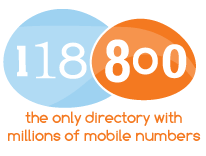Mobile number directory sparks outcry
Public upset at being in database unknowingly

A new mobile phone number directory service, 118 800, has sparked outcry from the UK public after hearing it has 'millions of numbers' on launch.
The new service works by allowing users to request a name and mobile number of any given person for £1.
If said person is in the database, they will receive a text with the number of the person trying to contact them, asking them to make the call.
Connectivity, the company behind the 118 800 scheme, says it gained the numbers "generally from companies who collect mobile telephone numbers from customers in the course of doing business and have been given permission by the customers to share those numbers".
When you generalise, the general lies
It's the 'generally' part that's upsetting people, with message forums and Twitter alight with people railing against the new system.
However, users can send an 'E' to 118 800 to have their number de-listed from the service, and early reports have found very few people could see their name in the database anyway.
Sign up for breaking news, reviews, opinion, top tech deals, and more.
The generation gap between the introduction of landline Directory Enquiries is growing all the time, and it seems people have forgotten that it's a very similar system to that one, except with the landline option numbers were actually given out and written down in a big book, as well as being much harder to become ex-directory.
Sweden already has such a mobile phone number database in a similar way to landlines, and Connectivity has strongly maintained that it has acted within regulations to acquire the numbers, as well as making sure it removes all under-18 numbers as best it can.
Perhaps the new system, rather than being labelled as an evil tool of anti-privacy, highlights the fact that our details are being collected and sold far too easily without our express consent?

Gareth has been part of the consumer technology world in a career spanning three decades. He started life as a staff writer on the fledgling TechRadar, and has grew with the site (primarily as phones, tablets and wearables editor) until becoming Global Editor in Chief in 2018. Gareth has written over 4,000 articles for TechRadar, has contributed expert insight to a number of other publications, chaired panels on zeitgeist technologies, presented at the Gadget Show Live as well as representing the brand on TV and radio for multiple channels including Sky, BBC, ITV and Al-Jazeera. Passionate about fitness, he can bore anyone rigid about stress management, sleep tracking, heart rate variance as well as bemoaning something about the latest iPhone, Galaxy or OLED TV.